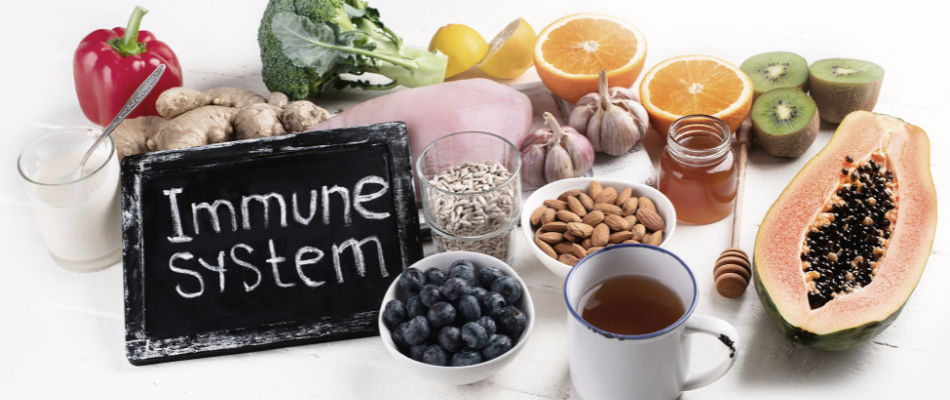One of the most common hurdles we face in the new year is a compromised or slowed immune system. This is largely due to overindulgence and an overall poor diet. Most dieticians recommend a diet rich in the foods discussed in this article and also a daily intake of 1000mg vitamin C consumed daily with foods.
Citrus fruits
These fruits are rich in vitamin C which is thought to increase the production of red blood cells. Because our body does not produce or store vitamin C, you need daily vitamin C for continued health. Luckily with such a variety to choose from, it is easy to add to breakfasts, smoothies and snacks!
Red bell peppers
It is often thought that citrus fruits contain the most vitamin C. If we measure, ounce for ounce red bell peppers contain twice as much vitamin C as citrus, they are also a rich source of carotene! Besides helping your immune system, vitamin C together with Beta carotene may help maintain a healthy skin and eyes.
Broccoli
Broccoli contains a wide spectrum of vitamins and minerals, vitamins A, C, E, antioxidants and fibre. Broccoli has the potential to be the healthiest vegetables to include on your plate, provided it is cooked as little as possible in order to preserve the nutrients.
Garlic
It is little known that garlic is a must have for your health, early civilisations recognised its value in fighting infections. According to the centre for complementary and integrative health, garlic may help to lower blood pressure and stave off the hardening of arteries. The immune boosting properties seem to be associated with a high concentration of sulphur containing compounds.
Ginger
Ginger is another wonderful ingredient to use when falling sick, especially colds and flu. Ginger may help to decrease inflammation, which helps to ease a sore throat. Ginger may also help when you have an upset stomach as it may reduce nausea. Ginger has also been associated with cholesterol lowering properties.
Spinach
Spinach is not only rich in vitamin C but also packed with numerous anti-oxidants and beta carotene, which may increase our immune system’s ability to fight off infections. The same as broccoli, spinach is healthiest when cooked as little as possible in order to retain nutrients. It is also worthy to note that heat does not always destroy nutrients, light cooking may actually enhance vitamin A levels in broccoli by releasing oxalic acid.
Yoghurt
Prioritise yoghurts that contain “live and active” cultures, normally most yoghurts are too highly processed and contain too many added sugars. In this sense Greek yoghurt is always a great bet as it is considered to be one of the most natural and unprocessed types. If Greek yoghurt is not sweet enough, you can always sweeten with honey or by adding other immune boosting fruits.
Almonds
Approximately half a cup serving of almonds, provides nearly 100% of our recommended daily allowance for Vitamin E and is a great source of healthy fats.
Turmeric
A key ingredient in many curries, it also has anti-inflammatory properties used in treating osteo and rheumatoid arthritis. Research has shown that turmeric contains high amounts of curcumin which may decrease exercise induced muscle damage.
Green and matcha tea
Most tea’s are packed with flavonoids, which are antioxidants. Green tea and matcha is an excellent source of the amino acid l-theanine, this compound may aid in the production of germ fighting compounds in your T-cells.
Papaya
Papaya is another fruit loaded with vitamin C. You can find 224% of the daily recommended amount of vitamin C in a single papaya. Papayas also have a digestive enzyme called papain that has anti-inflammatory effects. Papayas have decent amounts of potassium, B vitamins, and folate, all of which are beneficial to your overall health.
Kiwi
Like papayas, kiwis are naturally full of a ton of essential nutrients, including folate, potassium, vitamin K, and vitamin C. Vitamin C boosts white blood cells to fight infection, while kiwi’s other nutrients keep the rest of your body functioning properly.
Poultry
When you’re sick, chicken soup is more than just a feel-good food with a placebo effect. It helps improve symptoms of a cold and helps protect you from getting sick in the first place. Poultry, such as chicken and turkey, is high in vitamin B-6. About 3 ounces of light turkey or chicken meat contains 40% to 50% of your daily recommended amount of B-6.
Sunflower seeds
Sunflower seeds are full of nutrients, including phosphorus, magnesium, and vitamin B-6. They’re also incredibly high in vitamin E, with 82% of the daily recommended amount in just a quarter-cup serving.
Shellfish
Shellfish isn’t what jumps to mind for many who are trying to boost their immune system, but some types of shellfish are packed with zinc. Zinc doesn’t get as much attention as many other vitamins and minerals, but our bodies need it so that our immune cells can function as intended. Keep in mind that you don’t want to have more than the daily recommended amount of zinc in your diet. For adult men, it’s 11 milligrams, and for women, it’s 8 mg. It is worthwhile to note too much zinc can inhibit immune system function.








